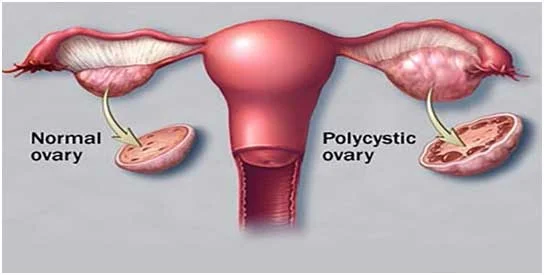Polycystic Ovarian Disease (PCOD), also known as Polycystic Ovary syndrome (PCOS) is a very common condition affecting 5% to 10% of women in the age group 12–45 years. It is a problem in which a woman’s hormones are out of balance. It can cause problems with menstrual periods and make it difficult for her to conceive. The principal features include no ovulation, irregular periods, acne and hirsuitism. If not treated it can cause insulin resistant diabetes, obesity and high cholesterol leading to heart disease.

Normally, the ovaries make female sex hormones and a tiny amount of male sex hormones (androgens). These help regulate the normal development of eggs in the ovaries during each menstrual cycle. Polycystic ovary syndrome is related to an imbalance in these sex hormones. In PCOS, they start making slightly more androgens. This causes patients to stop ovulating, get pimples and grow extra facial and body hair.
Follicles are sacs within the ovaries that contain eggs. Normally, one or more eggs are released during each menstrual cycle. This is called ovulation. In polycystic ovary syndrome, the eggs in these follicles do not mature and are not released from the ovaries. Instead, they can form very small cysts in the ovary-.hence the name polycystic ovaries.
PCOS seems to run in families, so the chance of having it is higher if other women in the family have PCOS, irregular periods, or diabetes
- Androgens or "male hormones," although all women make small amounts of androgens....Higher than normal androgen levels in women can prevent the ovaries from releasing an egg (ovulation) during each menstrual cycle. Excess androgen produced by the theca cells of the ovaries, due either to hyperinsulinemia or increased luteinizing hormone (LH) levels.
- Due to increased production from the anterior pituitary.This stimulates ovulation but may have an abnormal effect on the ovaries if levels are too high.
A protein in the blood, which binds to testosterone and reduces the effect of testosterone.
- Hormone that stimulates the breast glands to produce milk in pregnancy.
(a hormone that helps convert sugars and starches into energy) If you have insulin resistance, your ability to use insulin effectively is impaired, and also your pancreas has to secrete more insulin to make glucose available to cells (so, hyperinsulinaemia) Excess insulin might also affect the ovaries by increasing androgen production, which may interfere with the ovaries' ability to ovulate.
A significant hereditary component, if your mother or sister has PCOS, you're more likely to have it.
If you're overweight, your chances of developing it are greater. As weight gain increases insulin resistance. Fatty tissues are hormonally active and they produce estrogen which disrupts ovulation.
Investigations like blood sugar estimation, thyroid hormone tests, ultrasound of the abdomen and pelvis are done. Sometimes serum androgens, luteinising hormone and other hormone estimations may be ordered
Women who have been afflicted by PCOD are quite likely to have high-risk pregnancies hence they need meticulous monitoring and utmost discretion. Miscarriage, premature delivery and gestational diabetes are some of the complication which women can face. However, there are a lot of efficacious treatments that help women with PCOD become pregnant
Changing the way you eat can help you manage the symptoms much better. PCOD symptoms are aggravated with consumption of certain types of foods so staying away from refined flour, sugar, dairy products and carbohydrates helps to greatly reduce insulin imbalance and associated symptom occurrence. Replacing such foods with raw fruits, green leafy vegetables and foods with a low glycemic index helps to maintain the nutrition value and also aids weight loss.
Only six month treatment with our Unani Herbal Medicines without any side effect and 100% natural.
The HOO-IMM PLUS (A, B, C, D, E) is an absolutely new, novel, pioneering and revolutionary concept from Unani Herbal to medical science. It is a very safe, efficacious Indian medicine for the relief of AIDS according to the degree & stage of affliction.
View More